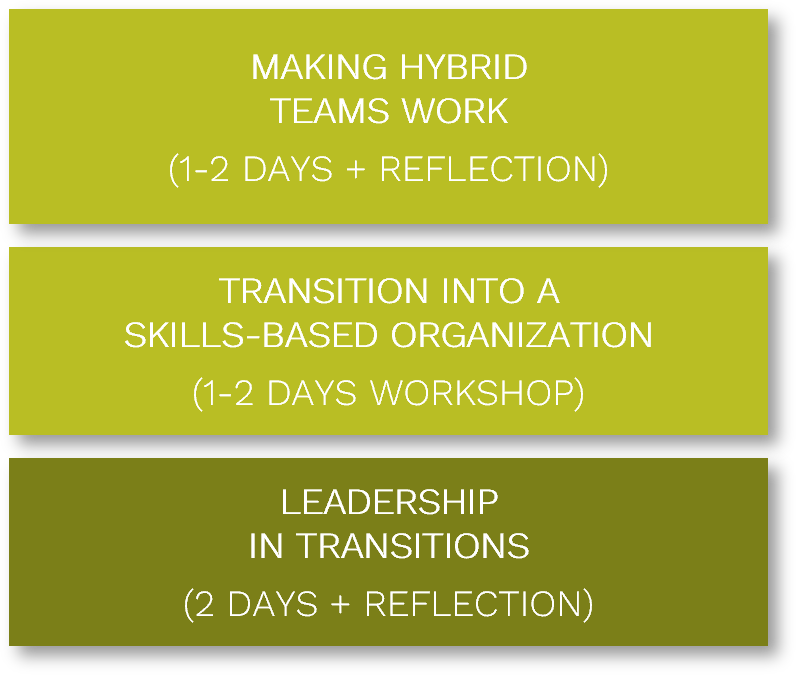Why Transition skills?
Decarbonisation, digitalisation, new ways of working, crisis response, strategic pivots - the list of external impulses for fundamental transitions in organisations will not shorten over the next years. As a consultancy we focus on the strategy and decision making process for decarbonisation in industrial companies. That’s where we learn about the challenges and shortcomings of organizations in coping with cross-organizational change processes.
To enable and support creative, effective and value oriented leadership in transitions, we decided to substantiate our practical insights with leading-edge academic know-how and offer them in our TRANSITION SKILLS ACADEMY.
Successful transformations, especially those driven by a dynamic and uncertain environment, require an upgrade in skills and culture to...
When all three levers in the illustration above are worked on, creative leadership through those transitions becomes possible. That’s why you will find elements of all three dimensions in all of our programs, while each still has a clear and distinct focus.
Our skill development modules
-

Decision Making under uncertainty
In our Decision Making program we convey how to overcome complex decision situations in uncertain and changing frame conditions.
Practitioner’s Course
The trained tools and methods allow smarter and faster decision making, while the focus on biases protects against psychological pitfalls. The program uses practical exercises, a comprehensive case study and reflections about individual experiences to connect the theoretical framework with daily challenges.
The whole organization will benefit from an attitude of embracing uncertainty and a clear line of sight to value, while your corporate culture will benefit from fact based, unbiased discussions.
Decision Making for Leaders
Preparing the decision basis requires a different skill-set than assessing the quality of the prepared documentation and actually taking the decision. After the course decision-makers know their “bill of rights” and are able to responde to the team in a constructive and inspiring way.
Special topics & audiences
Those training address the needs of specific target groups, such as finance, project owners, supervisory board members or decision makers in multi stakeholder settings.
-

Project Design and management
In each transition projects still are one of the key means to deliver the required artefacts and results. The difference to stand-alone green field projects lies in the dynamic frame conditions, which in particular challenge the classical waterfal approach.
PM Foundation
Our Project Management Foundation program focusses on building the ability to
initiate projects in a way so that they truly address the organisation’s needs (“do the right things”)
plan and set them up in a way that fits to the project’s complexity and dynamics (esp. agile vs classical) and
to accurately deliver the required results (“do the things right”) withing define budget and timeframe.
PM Advanced
After this course Project Managers are versatile in managing their coreteam in various working settings, facilitating the key workshops in projects, set up and steer multi stakeholder decision processes, implement decisive project controls and address specific planning topics aong the project life-cycle.
PM for Leaders
Beside establishing PM processes and capabilities, creating a PM culture includes addressing Senior Management, Line Managers and potential Project Owners.
-

Leading through transitions
Leadership in transitions
This program takes you on a journey to explore your leadership skills in times of change. It helps you to understand yourself and your team, as well as it provides you with a personal digital leadership plan. It further helps you to lead diverse and self-organized teams and gives you the newest scientific insights into leading a changing organization.
Making hybrid teams work
After the course you will be able to empower your organization to grow into an organization that attracts talents by designing and implementing appropriate organizational models and interventions. You will be able to cope with the most pressuring hybrid teamwork challenges and guide your organizations to become a better place to work.
Transition into a Skills-based Organization
This course will provide you with the insights on the principals on how to redesign work and it will equip you with a process to gain full transparency about the skills and competencies your organization has and needs. It will enable you to generate a cross-company, uniform terminology, and skill structure and will familiarize you with different task-skills matching technologies for an empowered workforce.


